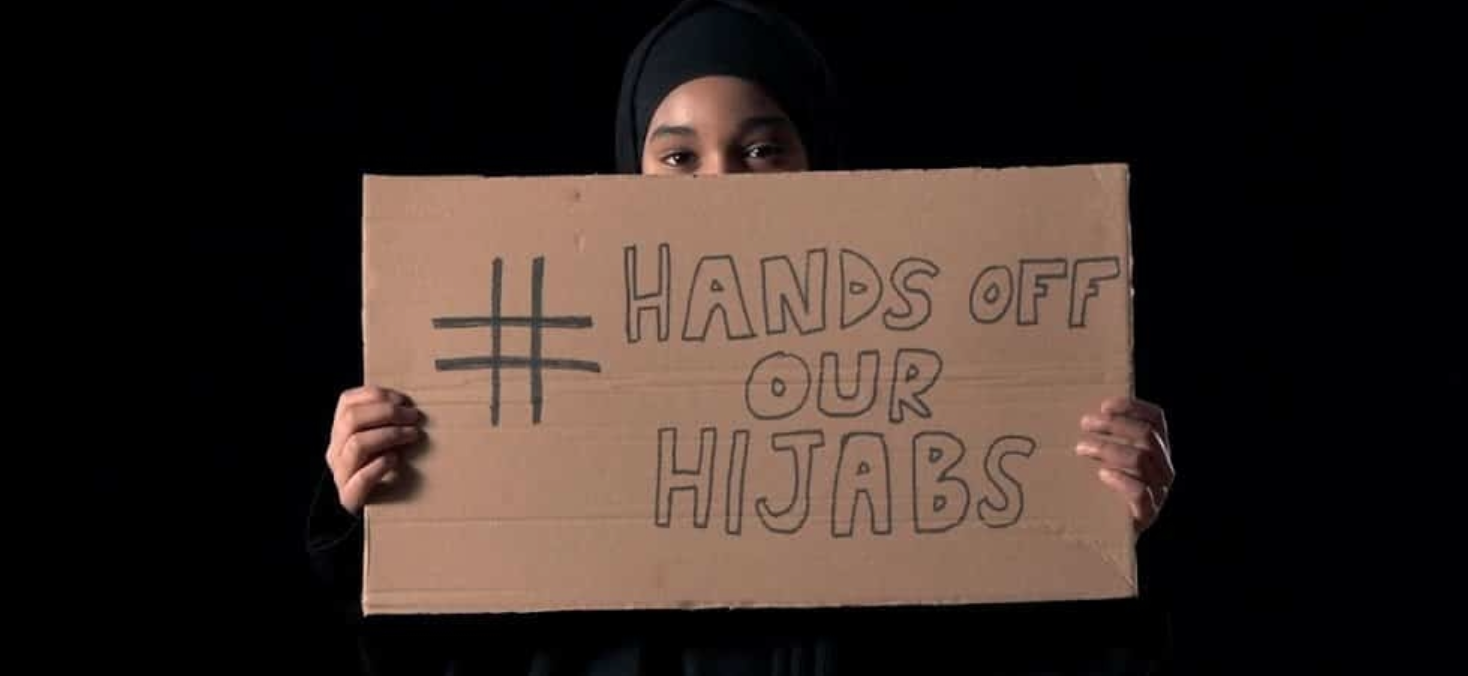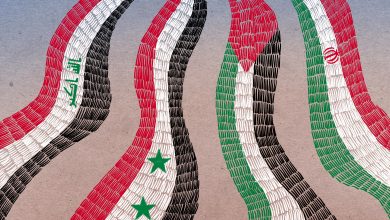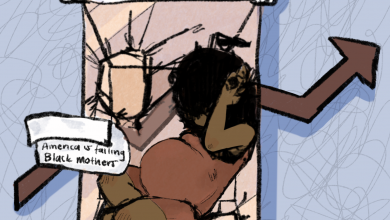The French Paradox: France’s Hijab Ban and the Colonial Project

Source: CAGE Press Release, Schedule 7
Image description: A person in a black hijab holds a cardboard sign with black letters reading #HandsOffOurHijabs against a black background.
Despite France’s motto “liberté, egalité, fraternité,” French legislators have once again proposed a blatantly discriminatory law. The so-called hijab ban proves the government maintains the same racist and dehumanizing ‘logic’ that allowed them to espouse those ‘Republican values’ of liberty, equality and fraternity, while overseeing one of the largest colonial empires in history.
France made headlines at the beginning of April with the introduction of a piece of legislation that effectively prohibits people under 18 from wearing hijabs in public. The ban was proposed as an amendment to the xenophobic ‘anti-separatism’ bill, and passed in the Senate with support from conservatives and the far right.
It is virtually guaranteed to fail in the National Assembly, but nevertheless, this ban poses a grave danger to French Muslims. Reactionary legislation like this is often put forth to gauge public opinion, shift the political spectrum, and excite the political base—which can increase xenophobic attacks. Furthermore, it heightens the possibility of a similar ban being passed in the future. France’s current law banning hijabs in public schools was first proposed in the 1990s and was considered impossible at the time. It was passed in 2004, less than ten years later; the current proposal builds off the existing law by extending the ban to anywhere in public.
If this hijab ban were to become law, it would give police more power to harass, detain, and assault Muslim youth, surveil Muslims, and increase police budgets and presence in Muslim communities. The government’s plans for enforcement rely on racial profiling and policing.
However, the justified outrage over the hijab ban has somewhat obscured the underlying anti-separatism bill, which has already passed in the National Assembly with broad support from across the political spectrum.
The anti-separatism law was originally proposed by French president Emmanuel Macron, who billed it as a tool to combat growing religious extremism. The law contains a host of invasive and xenophobic items at the intersection of Islamophobia, French colonization, and the growth of the surveillance state. Among other things, the law requires Islamic organizations to pledge their loyalty to the French state, outlaws political discussion in mosques, and defines any statements calling the French government racist as defamation.
Macron rationalized the law as a necessary tool to preserve laïcité, or French secularism, and counter the growth of a ‘parallel society.’ To an inattentive or uninformed audience, this may seem relatively harmless; in reality, both concepts are deeply enmeshed in French colonial and white supremacist rhetoric.
Laïcité was enshrined in French law in 1905 and was originally intended to protect the right to practice one’s chosen religion, without government interference or persecution. Since around the 1970s, as France’s Muslim population has grown due to immigration from former colonies, laïcité has increasingly been weaponized to criminalize Muslims.
In his speech unveiling the anti-separatism bill in October 2020, Macron elucidated the dangers posed by the ‘parallel society,’ which he defines as widespread Islamic extremism being propagated within Muslim communities by religious and cultural organizations. Among the examples he cited as proof of this threat are “children being taken out of school, [and] the development of separate community sporting and cultural activities” supposedly indoctrinating Muslim children with anti-French teachings.
Macron’s ‘parallel society’ fits neatly into post 9/11 Islamophobia, characterized by the build up of a security state and criminalization of Muslims in the name of national safety. In fact, the War on Terror has given governments broad support for regulating Muslim communities. The Obama-era Countering Violent Extremism (CVE) program in the United States, for example, monitors Muslim communities for ‘indicators of radicalization’—which includes wearing a hijab and going to a mosque. The French government uses similar strategies, like forcing mosques to close and targeting Muslim communities with violent police raids.
However, the history behind the hijab ban cannot be reduced to War on Terror Islamophobia; it is deeply connected to France’s colonial past and present. According to Hoda Katebi, a writer and activist focusing on fashion, “the hijab, women’s bodies, and fashion at large have long been battlegrounds for political power, colonization, and state control.”
The beginning of French colonialism is typically dated to 1830, when France first invaded Algeria. Unlike its other colonies, the government incorporated Algeria into metropolitan France and encouraged European settler colonialism in the country. As waves of settlers came over, native Algerians were violently removed from their land and subjected to colonial oppression.
The contours of the colonial system in Algeria are exposed by its geography—or perhaps this geography is necessary for colonization. Frantz Fanon, Martinican psychiatrist and decolonial philosopher, spoke extensively of geographical compartmentalization, or the stark and often violent divisions between colonized and colonizer spaces. The former is desperate, crowded and displaced (by the colonizer’s design); the latter is an imposing, Europeanized city marked by whiteness. There is no overlap nor reconciliation between the two, for the colonial project requires the colonized’s oppression.
Furthermore, this compartmentalization was mirrored by laws banning native Algerians from accessing the rights and benefits of French citizenship, despite living within metropolitan France and being subject to its laws. European settlers were governed by French law, while an entirely different legal code was applied to the Indigenous majority.
The French government justified colonial oppression, in part, by arguing that Islam was fundamentally incompatible with French values and that Muslims would never be able to assimilate into French society. At the same time, the colonial project worked to strip colonized Muslims of their culture and religion, including campaigns against the hijab.
Source: The French Propaganda Bureau, 1960s. “Dévoilez-vous!” Contre-Attaques.
Image description: French propaganda poster from the Algerian War. Four North African women wearing veils are in a line; those at the back are fully veiled and drawn in less detail. The women closer to the front are more detailed and less veiled; the woman at the front is unveiled, and drawn in detail with a smile, makeup, and jewelry. The text reads, “N’êtes-vous donc pas jolie? Dévoilez-vous!” English translation: “Are you not pretty? Unveil yourself!”
The lineage of the hijab ban stretches, unbroken, back to the French colonial system. From the text of the bill to the colonialist and Islamophobic rhetoric that normalizes this level of government surveillance and violence, the justifications that have been made for it, and the violence that will be used to enforce it, the recently proposed hijab ban is blatant proof that the French government is diseased.
While the anti-separatism bill to which the hijab ban was added as an amendment has received less public attention, it threatens the safety and autonomy of Muslims in France as much, if not more, than the ban. Furthermore, the ‘parallel society’ that it seeks to undo is entirely of the French government’s own making.
During the 1950s and 1960s, immigration from North Africa surged. France embarked on an extensive post-war rebuilding program and encouraged immigration from the former colonies to build a large, over-exploited, and underpaid workforce. Notably, this was the first time there was a sizeable non-white population in France, as most previous immigration had been from other parts of Europe.
When the economy began to slow in the 1970s, xenophobia and Islamophobia increased as immigrants were used as scapegoats for the failures of the economy and capitalism. Many North African immigrants and their families lost jobs and restrictions on immigration tightened. In the decades since then, France has replicated much of its colonial policy within its own borders.
As Fanon says, “the colonial world is a compartmentalized world.” In Paris, decades of housing crises, racism, and inequality have split the city. Beginning in the 1980s, many immigrants moved to the banlieues (similar to American projects outside city limits), resulting in both social and physical isolation. In popular imagination, Paris became synonymous with ‘real’ (white) France and the banlieues were branded as foreign. Furthermore, many banlieues, particularly those with large Muslim and racialized populations, lack adequate social services, education, healthcare, and transportation. In some banlieues, it can be almost impossible to get to central Paris.
Unequal access to social services, segregation, and impassibility between the ‘compartments,’ with state-sanctioned violence underpinning the entire system—the French government is using the tools they learned in Algeria to oppress Muslims within their own borders. The hijab ban and anti-separatism bill are symptoms of the French paradox: liberté, égalité, fraternité—but only for some.




